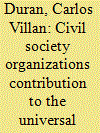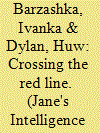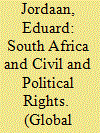| Srl | Item |
| 1 |
ID:
108421


|
|
|
| 2 |
ID:
129322


|
|
|
| 3 |
ID:
171448


|
|
|
|
|
| Summary/Abstract |
Why do repressive states create human rights institutions that cost them money and political capital but fail to silence international criticism? The academic literature assumes that states engaging in disingenuous human rights behavior are hoping to persuade (or deceive) liberal Western states and international advocates. But if human rights promoters in the West are the target audience for the creation of these half measures institutions, the strategy appears puzzlingly miscalculated. It reveals that the repressive state is sensitive to international opinion, and often results in increased pressure. The author argues that states engaging in human rights half measures are playing to a different, previously overlooked audience: swing states that can act as veto points on multilateral efforts to enforce human rights. The article illustrates these dynamics with a case study of Sri Lanka’s response to international pressure for postwar justice. The author shows that although the creation of a series of weak investigative commissions was prompted by pressure from Western governments and ngos, it was not an attempt to satisfy or hoodwink these actors. Instead, it was part of a coalition-blocking strategy to convince fellow developing states on the UN Human Rights Council to oppose the creation of an international inquiry and to give them the political cover to do so.
|
|
|
|
|
|
|
|
|
|
|
|
|
|
|
|
| 4 |
ID:
165910


|
|
|
|
|
| Summary/Abstract |
For constructivists, a state’s identity implies its preferences, interests, and resultant actions in international affairs, which is why constructivists expect democracies to support human rights internationally. This study examines South Africa’s record on civil and political rights at the UN Human Rights Council. While there is an element of anti-imperialism in South Africa’s identity that might help explain some of its actions, human rights remain important in South Africa’s self-understanding. Despite the presence of human rights in South Africa’s identity, at the Human Rights Council, South Africa’s actions have ranged from failing to uphold civil and political rights to supporting their restriction. A bifurcated national identity therefore diminishes the predictive power of a constructivist national identity approach.
|
|
|
|
|
|
|
|
|
|
|
|
|
|
|
|
| 5 |
ID:
102009


|
|
|
|
|
| Publication |
2010.
|
| Summary/Abstract |
FOUR HUNDRED AND TEN YEARS ago, on 17 February 1600 Giordano Bruno, with an iron spiked gag in his mouth was brought to the Campo dei' Fiori to be burnt at the stake for free thinking.1 Chained to the stake he was tied with damp ropes which, having dried in the fire shrank and cut into the flesh.2 His death was no less shocking than his ideas.
|
|
|
|
|
|
|
|
|
|
|
|
|
|
|
|